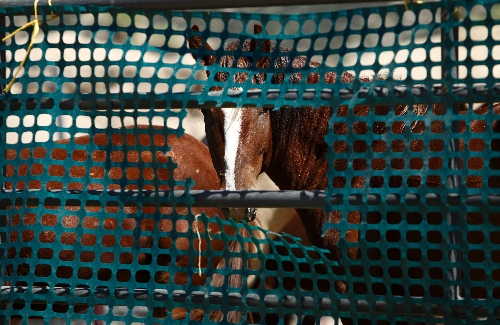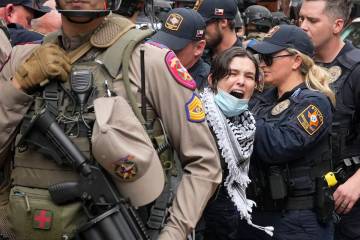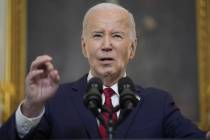Wild Horses: Wealthy rescuer creates eco-sanctuary
WELLS --
At the end of America's most popular Western movies, the celluloid cowboy in the white hat always rides to the rescue.
Madeleine Pickens remembers watching John Wayne flicks with her father and rooting for the late Hollywood hero to save the day.
"I was always sure that I would meet John Wayne and that he would fall in love with me and we would live on the range," Pickens says. "I did better. I met Boone Pickens. And we're living happily ever after."
The Texas billionaire's wife wants an equally happy ending for the nation's last wild horses, too. And she wants to be the hero riding to their rescue.
She has purchased two ranches in Elko County, about 25 miles south of Wells, to build a "living museum" for mustangs, an eco-sanctuary where they can roam free.
Her Spruce Mountain and Warm Creek properties cover roughly 18,000 acres of private land and 570,000 acres of public land, including breathtaking desert valleys and one peak above 10,000 feet.
Pickens hopes to run at least 1,000 wild horses on the rugged public land, which came with grazing rights for the same number of cattle.
And she wants to let people come and view the horses, visiting an educational center that would teach children and adults about America's heritage. Visitors could sleep in tee-pees on the range and take covered-wagon rides along the routes that settled the West.
"My dream is starting to come true," says Pickens, three years into tangling with red tape and local ranchers. "I want it to come true for the American people, for everybody to see these incredible horses."
Pickens fears the mustangs will disappear without her help.
Preparing for a helicopter tour of her place, Pickens settles her rescued dachshund, Tommy, on her lap. Once airborne, she starts counting small bands of wild horses already running on the range.
"Not too low, I don't want to scare them," she tells the pilot.
The rumbling sound of the rotor sends the mustangs on their way, fleeing each time the helicopter passes high overhead.
Three horses run down from the pinyon pines while another half dozen pound across the valley floor. Silent puffs of dust lift toward the sky. Two more mustangs appear, then a dozen. Pickens spots nearly 50 during a 45-minute flight on public land the BLM says is overpopulated by several hundred horses.
"I don't see them," she says. "It's 10 percent of what they say."
She stares back out the helicopter window, watching flying manes and tails trace across the desert, chasing the next hill.
"There's something magical about the herds," Pickens says, lamenting that she didn't try to save the mustangs sooner. "Why did I wait so long?"
'LIFE-CHANGING EXPERIENCE'
Pickens, 64, came to America in 1969, drawn partly by the cowboy and Indian culture of the early U.S. that she saw on the Big Screen.
Born in Iraq of a Lebanese mother and British father, she says that she had always dreamed of coming to America and seeing horses everywhere.
"When I arrived here, there weren't any and I was disappointed," she says.
For years, she didn't know horses were killed for meat.
During her first marriage, Pickens was a thoroughbred racehorse breeder with her husband, Allen Paulson, founder of Gulfstream Aerospace. The California couple owned major winners, including two-time Horse of the Year Cigar, who won 16 consecutive races.
"Whenever a horse would be hurt on the track, I would say, 'Where are they taking her or him?' " Pickens says. "And somebody would laugh and say, 'The glue factory.' And I thought, 'Oh, they're just being silly.' "
A Humane Society representative set her straight. It happened after Pickens had rescued 800 dogs and cats from Hurricane Katrina in New Orleans, airlifting the animals to safety in 2005.
Pickens says she was ashamed she hadn't known about the slaughter of American horses, including thousands of wild horses over the years.
"I was devastated," she recalls. "It was a life-changing experience."
By then, she was married to T. Boone Pickens, and they advocated the end of the U.S. horse slaughter industry, even testifying before Congress. The House outlawed the practice, but the bill never passed the Senate. Instead, lawmakers cut funding for U.S. government inspections, which eventually helped shutter the industry. Now there's a move in Washington to restore that money.
Stopping the slaughter of wild horses also kick-started the private portion of Pickens' sanctuary on her Warm Creek property.
A year ago, wild horse advocates pleaded with her to rescue 500 mustangs that were likely headed for slaughter in Mexico.
The wild horses were among 900 rounded up by the Pyramid Lake Paiute Tribe's sovereign reservation, northeast of Reno.
Those horses weren't protected by the 1971 Wild Free-Roaming Horses and Burros Act and weren't managed by the Bureau of Land Management.
Tribal Chairman Wayne Burke said the Paiutes' first concern was to get the horses off the reservation because they weren't native to the area and were destroying the range "almost like a wildfire."
"Some of them might be getting slaughtered," Burke said, adding he didn't question a horse dealer taking them to auction in Fallon.
Ranchers, horse dealers and so-called "killer buyers" frequent the auction houses, including one in Fallon.
Pickens remembered getting a frantic call around Christmas last year.
"I said, 'What am I going to do with them? I have no place to put them,' " Pickens remembers. "And I prayed. I said, 'Oh, God, tell me what to do. I don't want blood on my hands.' Then it occurred to me that I can put them out here at the Warm Creek. They would have a home."
A wild horse rescue group from California bought about half the captured Paiute horses on her behalf. The tribe then began dealing directly with the group, including donating captured foals.
Ole Olson, a 76-year-old horse trader in Elko, says he was present when some of the Paiute horses went up for auction. He says Pickens' buyer outbid everyone, paying $36,000 for 73 horses on one day he was there.
"I think they're crazy, that's what I think," Olson says of the mustang rescuers. "One of these days we're all going to have to eat horses."
Olson has a reputation as a "killer buyer," but he says he won't touch a horse with a BLM freeze brand because there's too much controversy.
"What the BLM needs to do is hold a public auction and let the do-gooders buy those horses and pay to feed them," he says. "And if the highest bidder is a slaughter buyer, then they ought to buy them."
Olson said he buys about 1,500 horses a year, including at auctions in Nevada and Montana. About half go to a feed lot in New Mexico, which ships them south of the border for slaughter.
The market price for horse meat has dropped from 70 cents to 12 cents a pound since the U.S. horse slaughterhouses closed, he says.
"They're hurting the horse market so bad," Olson says. "I like money and I like horses. They've been my living all my life."
SUPPORT FROM CITY
Though Pickens has faced plenty of opposition to her save-the-mustangs project, she has support from the city of Wells. At a crossroads of Interstate 80 and U.S. Highway 93, the city and its more than 1,300 citizens could use the business.
She's already created a few jobs by putting in about $500,000 worth of improvements on her land, including fencing. Pickens says she paid at least several million dollars for the Spruce Ranch and likely less for the smaller Warm Creek, although she refuses to provide a figure: "It's way too much money for something that should never require this amount of money just to make an impact."
Her biggest opponents are ranchers and the Elko County Commission, which voted against the eco-sanctuary, although it can't block it.
Demar Dahl, commission chairman and a second-generation rancher, has long fought encroachment of wild horses on public land, including court cases he filed in the 1970s and 1980s.
His main objection to Pickens' project is that it will turn a working livestock ranch that contributed tax dollars to public coffers into an operation that will be supported in part by U.S. taxpayers.
"They have to take livestock off the range, and they end up changing the custom and culture of our counties when they do that," Dahl says. "Instead of a viable economic enterprise paying the taxpayers for use of that land, what Mrs. Pickens wants is for the taxpayers to pay her for running horses on there. It's just backwards."
Dahl says the best solution is for BLM to sell the excess wild horses it rounds up and to lift the prohibition against them going to slaughter. He's supporting a plan for the National Association of Counties to file a lawsuit against the BLM to force the agency to remove more mustangs and use its authority to dispose of the animals it can't adopt out.
"The idea that you can't destroy a horse because they're the symbol of the pioneering West flies in the face of reason," Dahl said.
If Pickens succeeds, more range could be set aside for sanctuaries.
Pickens has a grand vision for her nonprofit Saving America's Mustangs Foundation, which she launched for the project. She wants to eventually open a series of eco-sanctuaries for all unadoptable wild horses rounded up by the BLM. Currently, more than 11,000 mustangs are in short-term holding, at a cost of $2,500 per horse per year.
Pickens argues she can save taxpayers $2 million a year by taking in 1,000 wild horses now and as much as $30 million annually if she eventually provides sanctuary for up to 15,000 mustangs.
Under her proposal, the BLM would pay Pickens about $475 per horse per year, about the same as it pays for the 30,000 excess wild horses living out their lives in long-term pastures in the Midwest.
The eco-sanctuary herds would not reproduce since the males would be gelded, and mares might be vaccinated for birth control as well. Pickens also envisions starting a breeding program one day with select herds to preserve diversity among the wild horses.
ECO-SANCTUARIES
Approving Pickens' project would require a major shift in how the BLM manages the wild horse program. Initially, the agency rejected it.
Last January, BLM Director Bob Abbey turned down her first plan, saying it wouldn't save taxpayers money and that her land didn't include enough water and forage for the wild horses. He also said it would require environmental analysis, and that the BLM would have to change grazing allotments from cows to horses, a first for the agency.
Pickens reacted with anger, quoting Abbey as saying publicly just weeks earlier that her project "has merit and deserves serious consideration."
Then she went back to work. She pressured the BLM through members of Congress, who threatened to cut BLM's budget unless it worked to get the wild horse and burro program under control.
The tactic succeeded.
In March, the BLM announced it was seeking to form public-private partnerships to create eco-sanctuaries for wild horses.
One type would be on private land only and could be anywhere in the United States. The second type would be located on combined public and private lands around the wild horse herd management areas in the West -- a description that fit Pickens' project perfectly.
Pickens put in proposals for both types of eco-sanctuaries. The BLM asked for more detail, and she supplied it with specifics on a grazing plan and other items on Oct. 31.
The BLM could announce by year's end how many projects have qualified.
Pickens is confident her eco-sanctuary will be approved. Even then, it will have to go through a rigorous assessment under the National Environmental Policy Act, which could take up to 24 months.
Ken Miller, BLM district manager in Elko, has been working with Pickens and says the process could even be expedited since hers is the only eco-sanctuary proposal in his district. The agency won't say how many proposals are under consideration in Nevada and nationwide.
As for Pickens, she says her eco-sanctuary will become a reality with or without the government's help since she has private land and a few bands of wild horses already are roaming her public rangeland.
"I would have been done by now, but you know having to deal with red tape is very difficult," Pickens says. "Frustration? Yes. You know, I want to get on with it. I want to be alive before this is finished.
"But we will make a home for the horses. And we will move forward."
WILD HORSES
Unbridled Passions, Untamed Costs





























